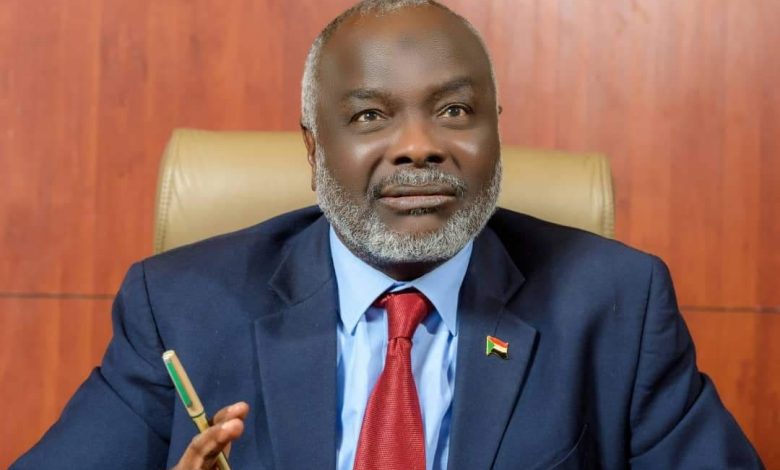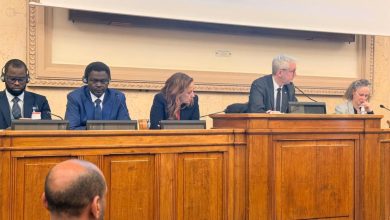Dr Jibril, JEM leader: we will fight RSF anywhere

Agencies – Sudan Events
Dr. Jibril Ibrahim the leader of the Justice and Equality Movement (JEM) was recently interviewed by the BBC about his most recent position along with other Juba Peace signatories to join the army and fight the Rapid Support Forces, not only in Darfur but anywhere a Sudanese citizen is affected.
He told the BBC that they have decided to enter the war to protect civilians and prevent ethnic cleansing. He said people were buried alive and shackled in El Genaina and Nyala. The danger is the division of the country along the lines of the Libyan model, which we cannot allow. We clearly conveyed our vision to the Chadian leadership that it be aware of the danger of supporting the militia.
Jibril said in the interview that they would continue contacts with all parties that provide support for Rapid Support Forces (RSF) to stop this type of action.
He said those movements will not only fight in Darfur, “but everywhere to defend the Sudanese citizens”
In the interview the head of the Sudanese Justice and Equality Movement, Dr. Jibril answered important questions after announcing that the movement had joined the fight with the Sudanese army against the rebel (RSF). Following is the full text of the interview
The interview text:
Question: Why did you decide to enter the war against (RSF)?
Jibril: We decided to enter the war to defend civilians who are being attacked in Sudan in general and Darfur in particular, where there is ethnic cleansing and crimes against humanity, where people are buried alive in El Genaina or handcuffed as in Nyala, or the assassination of Khamis Abkar, the late Governor of West Darfur. The danger now is not the spread of the war to Darfur, but rather the division of the country along the lines of the Libyan model, which we cannot allow.
Question: But now you will fight the war alongside the Sudanese army, which you have been fighting for decades, and your brother, founder of the movement, Dr. Khalil was assassinated, Is this an easy decision?
Jibril: No, it was not easy, so it took several months to make the decision, but in any case, we signed a peace agreement with the same army that we fought, and rapid support was part of the agreement. Most of the Rapid Support soldiers in fact come from the Darfur region and may be considered neighbors by virtue of the place, but they are at the forefront of committing violations and killing civilians, so what is important now is for Sudan to remain united, protect civilians, and ensure their safety.
Immediately after signing the peace agreement, we established joint forces from the movements that contributed to securing commercial convoys and securing vital facilities in the region and Kordufan.
However, after the RSF decided to attack the main cities in the region and its symbolic capital, El Fasher, we saw that they were turning to their alternative plan, which is to divide the country after failing to control the capital.
Question: In recent weeks, we have seen how RSF has been stretched in a number of cities in the region, such as Nyala and El Genaina, and now they are threatening El Fasher. How do you see the future of the conflict in the region and are there risks of the conflict escalation?
Jibril: Perhaps, but this is not our choice. This is the choice of the RSF, which chose to move the field to Kordufan and Darfur, and they announced their intention to attack El Fasher, which is the city to which people fled from El Genaina, Nyala, Kutum, Tawila, and other areas of the region after being exposed to violations there. As a result, the population of El Fasher has increased about three fold, making an attack on it an attack on all components of the region, and they will most likely attack El Daein as well. Therefore, we must be vigilant and prepared, and if they insist on attacking either city, we will fight them. We have no choice.
Question: Will you fight in El Fasher and Darfur only, or will you support the army in other regions such as Khartoum and Kordufan?
Jibril: We are Sudanese, and wherever a Sudanese citizen is attacked, we will defend him, regardless of his region. We do not claim that we have the capabilities that enable us to establish security in all parts of the country, but we will do everything in our power to provide protection and security for the citizen throughout Sudan.
Question: You accused RSF of receiving logistical support from Chad. What role can you play in this regard?
Jibril: We spoke to the Chadian President that this is not in Chad’s interest, as it will be the next target for RSF after Sudan, as RSF aims to form an empire in the region up to Niger, so Sudan will not be the only country that will be affected by the war. We clearly conveyed our vision to the Chadian leadership that it be aware of the danger of supporting such a militia, and we will continue our contacts with all parties that provide support for RSF to stop that



